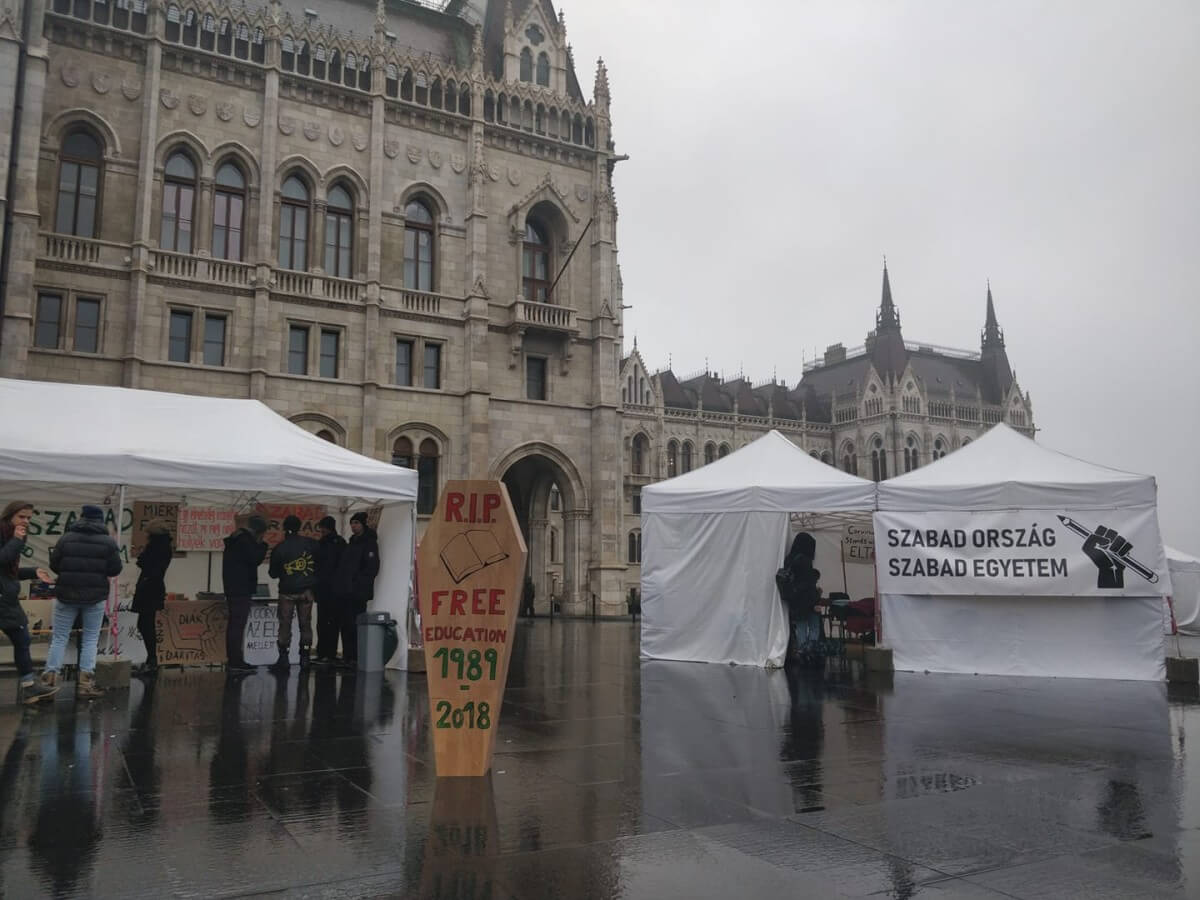A coalition of Budapest students from Central European University, Corvinus University, and Eötvös Loránd University occupies the parliament square to protest the Hungarian government’s attacks on academic freedom.
For a week, Kossuth Square turns into “Szabad Egyetem” – “Free University” hosting classes, public lectures, performances and discussions. The occupation started after the March for Academic Freedom on November 24, one week before the 1 December deadline for the Hungarian government to sign the agreement that would allow CEU to stay in Hungary. Due to the modifications to Hungary’s law on higher education, commonly known as Lex CEU, the university is not able to operate legally in Hungary as a free US accredited institution. Even though CEU fulfilled all conditions set by Lex CEU, the government has been stalling signing the agreement for more than a year. As rector Michael Ignatieff announced in October, if the university does not reach an agreement with the government, it will have to move its US-accredited programs to Vienna next year.

The attempts to force out CEU are only a part of the wider context of threats to academic freedom and autonomy. On the one hand, Hungarian academia faces politically motivated assaults that are unprecedented in the European Union, including the ban on Gender Studies and regulations increasing state control over the Hungarian Academy of Sciences. On the other, Orbán’s government is introducing ruthless neo-liberal reforms, such as the privatization of Corvinus University. “Since when do we measure knowledge in terms of money? Since students became products and companies are the buyers according to whose interest the opportunities at university are defined. What is the purpose of education? Profit-making droids or thinking people?” Via Molnár, a student of soon-to-be privatized Corvinus asked during Saturday’s protest.
“Universities need to be criticized, but not by interdictions, by banning professors and students, not by censorship, and not by deletion,” said philosopher and public intellectual Gáspár Miklós Tamás from the stage on Kossuth square. “The cause of education is not only the cause of professors and students” he added, “it is the cause of the whole political community that cannot be free without free education.”
Speakers on Saturday’s demonstrations, coming from the Hungarian Academy of Sciences, CEU, ELTE, and Corvinus, all emphasized the need for solidarity and cross-actor alliance of people and institutions. Solidarity not only with students and academics, but also refugees and workers. The latter is especially relevant in the face of the “slave-labor law” proposed by Fidesz, which would allow employers to further control overtime working hours. “Living in a bubble is convenient, but bubbles burst. Instead of individual avoidance strategies, let’s build alliances and organize,” appealed CEU employee Éva Bognár. The same issue was addressed by Imre Szijártó, student and one of the protest organizers: “This movement is about much more than CEU or even education. Our struggle is part of the fight for the soul of Hungary. When the attack on CEU started in 2017” Szijártó recalled, “Hungarian society stood in solidarity with the CEU community. Now, it is time for the CEU community to stand in solidarity with Hungarian society.”
I spoke to my colleagues participating in “Szabad Egyetem” to learn about their reasons to protest.
Levente, political science student: “What I see is that the government is continuously making higher education less accessible and available. In this way, I see the situation of the workers and the students similar – the government is not only privatizing and closing down universities, but for example, at the same time they are doubling the number of possible overtime hours. Their politics benefits the market and big companies over the society. By occupying Kossuth square and building a Szabad Egyetem, we can send a strong message: that we deserve much more.”
Miriam, sociology student: “I find the anti-semitism, anti-cosmopolitanism and anti-intellectualism that the government is using to increase its power very alarming. It makes me happy that CEU students decided not to organize their good-bye party but to create a coalition with other universities and scientific bodies affected by the government’s actions. There is international solidarity with the universities already, but I believe the greatest challenge now is for the intellectuals and workers of Hungary to stand up for each other. In parallel to what the government wants to do with academia, the workers are going to be affected by the new labor law that makes working hours “more flexible.” And this might remind us much of France in 1968. So let’s see what happens next.”
Iveta, history student: “I am joining the protest and am going to occupy Kossuth Tér, because I feel that supporting academic freedom is the right choice. If we fail in having freedom in academia, we will fail in freedom of speech in our countries. And since academic freedom affects every single person, I believe that not only students and faculty members, but every citizen should stand for Hungarian universities. If we give up there, we will give up everywhere.”
Adrien, PhD candidate in Gender Studies: “What is happening in Hungary concerns everyone in Europe and beyond. There needs to be a moment when we stand our ground against this system trying to impose its nationalist conservative ideology on the whole society through the control of the media, huge xenophobic propaganda campaigns, and attacks on education and research. I am particularly concerned about the way in which Orbán is trying to not only get rid of critical voices in universities, such as the “ban” of gender studies calling out his patriarchal authoritarianism, but also to turn universities into private, money-making machines to reproduce the elite. I am afraid future generations of Hungarians will not have the money to pursue their studies and will not have the chance to have courses questioning the existing social order.”

Endre, sociology student: “I am angry because a great intellectual community, a university full of inspiring people is being shut down for sheer and naked political reasons. I find this unacceptable, but I also think that kicking out CEU is only the tip of the iceberg. Viktor Orbán has managed to build up a monstrous power machine in the past 8 years: an arrogant political class supported by a loyal “national bourgeoisie” backed with cynical political strategists think they can do whatever to the fragmented, divided and tired-of-protests society of Hungary. We don’t want to give up without a fight and we hope other victims of Fidesz’s policies will join us. We need to realize that we are all in the same boat.”
For the full program of Szabad Egyetem, updates, and how you can get involved, see the event on Facebook.
![Political Critique [DISCONTINUED]](http://politicalcritique.org/wp-content/uploads/2015/09/Political-Critique-LOGO.png)
![Political Critique [DISCONTINUED]](http://politicalcritique.org/wp-content/uploads/2015/09/Political-Critique-LOGO-2.png)